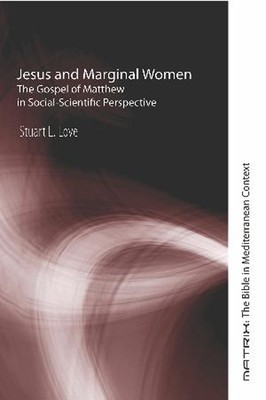
- We will send in 10–14 business days.
- Author: Stuart L Love
- Publisher: Cascade Books
- ISBN-10: 159752803X
- ISBN-13: 9781597528030
- Format: 15.2 x 22.4 x 1.8 cm, minkšti viršeliai
- Language: English
- SAVE -10% with code: EXTRA
Reviews
Description
Description: The Gospel of Matthew recounts several interactions between Jesus and "marginal" women. The urban, relatively wealthy community to which Matthew writes faces issues relating to a number of internal problems including whether or how it will keep Jesus's inclusive vision to honor rural Israelite and non-Israelite outcast women in its midst. Will the Matthean community be faithful to the social vision of Jesus's unconventional kin group? Or will it give way to the crystallized gender social stratification so characteristic of Greco-Roman society as a whole? Employing social-scientific models and careful use of comparative data, Love examines structural marginality, social role marginality, ideological marginality, and cultural marginality relative to these interactions with Jesus. He also employs models of gender analysis, social stratification, healing, rites of passage, patronage, and prostitution. Endorsements: This book employs a variety of social scientific models, and includes chapters that respectively analyze contextual issues and specific stories of Jesus and women in the Gospel of Matthew. Stuart Love persuasively argues that while the Gospel of Matthew does not advocate social and gender egalitarianism, it does attempt to promote Jesus's vision of a new surrogate family of God that challenges the structures of the agrarian household. This book is a welcome addition to studies on the Gospel of Matthew as well as those on women in early Christianity. --Alicia Batten, Associate Professor of Religious Studies, University of Sudbury Love's original studies of Matthean passages about women combine redaction criticism with Gerhard Lenski's macro-social model of an advanced agrarian society and anthropological themes such as male and female space. They show how the Matthean writer follows Jesus in granting dignity to women in a community-as-surrogate-family. Like the Matthean writer, Love brings out of his treasure room old and new; and like the Matthean disciples, students and scholars alike will understand with new insight. --Dennis C. Duling, Professor Emeritus, Canisius College About the Contributor(s): Stuart L. Love is Professor of New Testament and Christian Ministry at Pepperdine University. He is a member of The Context Group, Society of Biblical Literature, and Catholic Biblical Association.
EXTRA 10 % discount with code: EXTRA
The promotion ends in 21d.16:31:58
The discount code is valid when purchasing from 10 €. Discounts do not stack.
- Author: Stuart L Love
- Publisher: Cascade Books
- ISBN-10: 159752803X
- ISBN-13: 9781597528030
- Format: 15.2 x 22.4 x 1.8 cm, minkšti viršeliai
- Language: English English
Description: The Gospel of Matthew recounts several interactions between Jesus and "marginal" women. The urban, relatively wealthy community to which Matthew writes faces issues relating to a number of internal problems including whether or how it will keep Jesus's inclusive vision to honor rural Israelite and non-Israelite outcast women in its midst. Will the Matthean community be faithful to the social vision of Jesus's unconventional kin group? Or will it give way to the crystallized gender social stratification so characteristic of Greco-Roman society as a whole? Employing social-scientific models and careful use of comparative data, Love examines structural marginality, social role marginality, ideological marginality, and cultural marginality relative to these interactions with Jesus. He also employs models of gender analysis, social stratification, healing, rites of passage, patronage, and prostitution. Endorsements: This book employs a variety of social scientific models, and includes chapters that respectively analyze contextual issues and specific stories of Jesus and women in the Gospel of Matthew. Stuart Love persuasively argues that while the Gospel of Matthew does not advocate social and gender egalitarianism, it does attempt to promote Jesus's vision of a new surrogate family of God that challenges the structures of the agrarian household. This book is a welcome addition to studies on the Gospel of Matthew as well as those on women in early Christianity. --Alicia Batten, Associate Professor of Religious Studies, University of Sudbury Love's original studies of Matthean passages about women combine redaction criticism with Gerhard Lenski's macro-social model of an advanced agrarian society and anthropological themes such as male and female space. They show how the Matthean writer follows Jesus in granting dignity to women in a community-as-surrogate-family. Like the Matthean writer, Love brings out of his treasure room old and new; and like the Matthean disciples, students and scholars alike will understand with new insight. --Dennis C. Duling, Professor Emeritus, Canisius College About the Contributor(s): Stuart L. Love is Professor of New Testament and Christian Ministry at Pepperdine University. He is a member of The Context Group, Society of Biblical Literature, and Catholic Biblical Association.


Reviews